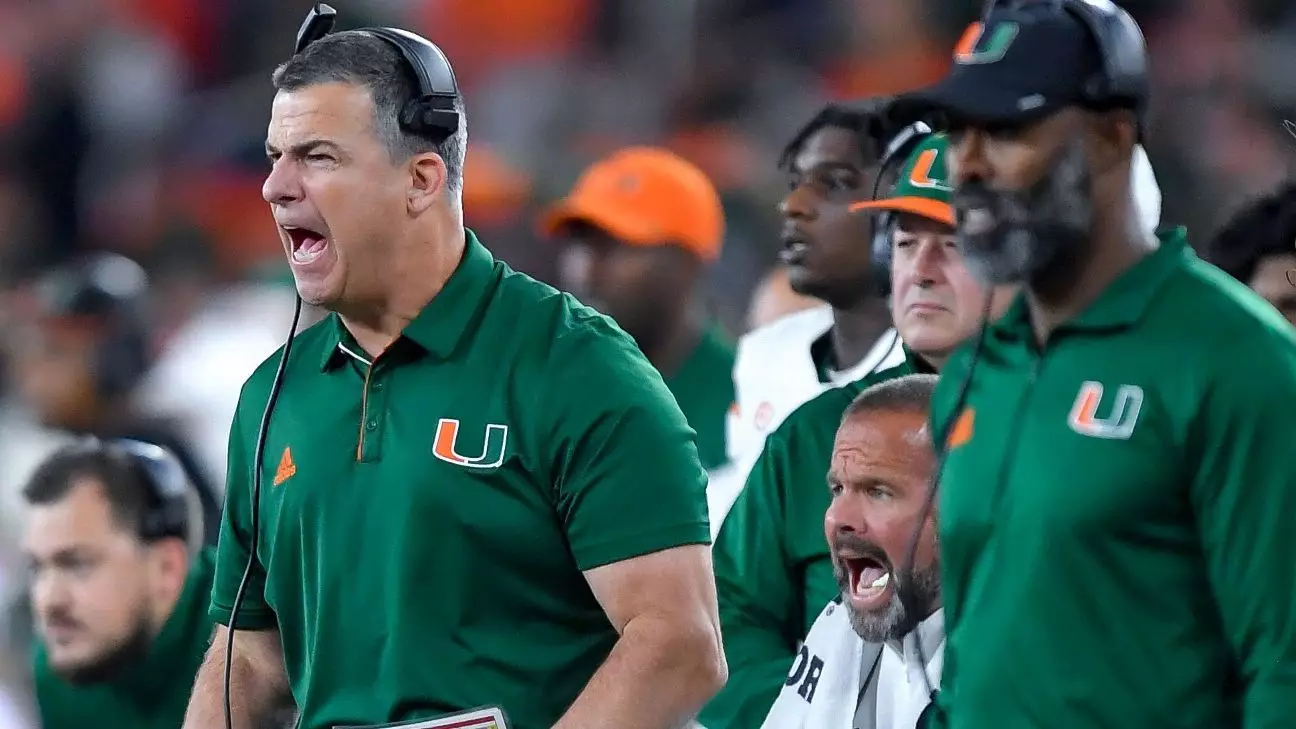The recent release of the College Football Playoff (CFP) rankings brought dismay to the Miami Hurricanes’ camp, as their hopes for a playoff spot diminished significantly. Falling to the No. 12 spot, Miami now faces a daunting task to justify a place in the upcoming 12-team CFP bracket. The Hurricanes had begun the season with promise, charting a 9-0 record before suffering a string of setbacks that ultimately derailed their playoff aspirations. Under the direction of first-year head coach Mario Cristobal, Miami’s season reflects the unpredictable nature of college football, where early-season successes are often overshadowed by late-season failures.
Given the weight of the final rankings, it is crucial to scrutinize the trajectory of Miami’s season. An early loss to Georgia Tech and a heartbreaking defeat to Syracuse exposed vulnerabilities in a team that once seemed relentless. Despite a strong start, their inability to maintain momentum led to a situation where they were excluded from the ACC Championship Game, further complicating their playoff ambitions. Cristobal’s acknowledgment of the team’s shortcomings, combined with a defense that struggled to contain opponents consistently, presents a case for reevaluation by the selection committee.
In the wake of the rankings’ release, the Atlantic Coast Conference (ACC) expressed its dissatisfaction with Miami’s placement. Commissioner Jim Phillips voiced his shock at the Hurricanes’ six-spot drop, emphasizing his belief that Miami “absolutely deserves better from the committee.” This public outcry came as a rallying cry for Miami supporters, pushing for reconsideration within the context of their overall performance and competitiveness throughout the season. The ACC’s criticism highlights an often contentious relationship between conference representatives and the CFP committee, particularly when prestigious programs feel slighted.
Cristobal echoed these sentiments during a radio appearance, urging the selection committee to objectively consider the Hurricanes’ results. His points regarding Miami’s ten victories and competitive losses bring to light a vital discussion regarding what factors truly define a playoff-caliber team. The fine line between winning and losing in tightly contested games underlines the unpredictable and competitive spirit inherent in college football.
Statistical Arguments for Inclusion
The statistical case for the Hurricanes begins with their nationally recognized offensive performance. Boasting an impressive average of yards and points per game, Miami’s attack, led by quarterback Cam Ward, demonstrated potency throughout the season. Moreover, achieving a perfect home record bolstered their case for a playoff berth. Cristobal notably pointed out the merits of their victories, such as a decisive win against Florida, arguing that substantial feats should not be overlooked in favor of teams with lackluster outcomes against ranked opponents.
Moreover, Miami’s position among the top teams in critical statistics, despite defensive inconsistencies, emphasizes their overall talent and potential. Ranking among the top 25 teams in both total yards and points allowed clearly indicates a capable program that, when operating at its peak, can compete with the nation’s best. However, the acknowledgment of their defensive breakdowns raises valid concerns among critics, highlighting a duality in their case for playoff participation.
As the Hurricanes grapple with this disappointing ranking, they must reflect constructively on their journey and outline their roadmap for future success. With a solid nucleus of players returning, Miami has the opportunity to build on the lessons learned from this season’s challenges. The discourse you often hear surrounding playoff rankings underscores the need for resilience and the power of a winning culture in college sports.
Looking forward, the Hurricanes and Coach Cristobal must channel this energy into motivation for next season. The key lies in learning from their mistakes and fortifying both the offense and defense to prevent a repeat of this year’s missed opportunities. The onus is on the coaching staff to cultivate a program that will not only attract elite talent but also foster a mentality that competes at the highest levels.
In closing, the Miami Hurricanes’ exclusion from the CFP serves as a stern reminder of the intricate and often tumultuous nature of college football rankings. While they have valid reasons to feel wronged, their journey now pivots toward redemption and preparation for future conferences, where they can aspire once again to earn their rightful place among the elite teams in college football.


Leave a Reply